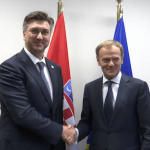ZAGREB, March 12, 2018 – Prime Minister and HDZ party leader Andrej Plenković on Monday dismissed media reports that he would run for President of the European Commission, saying that it was his job to be Croatia’s prime minister, and noting that a majority in the HDZ leadership did not see gender ideology in the Council of Europe Convention on preventing and combating violence against women and domestic violence, the so-called Istanbul convention.
Speaking to reporters after a meeting of the HDZ leadership, Plenković denied media reports that he would stand as a candidate for the European People’s Party (EPP) nomination for the president of the European Commission in elections to be held in the spring of 2019.
“It’s my job to be the prime minister and do what is necessary to deal with the numerous problems of the Croatian society,” Plenković told reporters after the meeting attended by his deputy Milijan Brkić, HDZ secretary-general Gordan Jandroković, Nada Murganić, Dražen Bošnjaković, Tomislav Čuljak and other senior HDZ officials.
Some evidently want to stir up the atmosphere in the context of this issue, Plenković said in a comment on an article in Monday’s issue of the Novi List daily.
It’s good if people think that Croatia has a prime minister who could also be the president of the European Commission, Plenković said, stressing that he was “Croatia’s prime minister who has a clear task to work to the country’s benefit within the EU.”
Today’s meeting of the HDZ leadership discussed the Istanbul Convention, with Plenković saying that “a vast majority of those who attended the meeting had thoroughly analysed the convention and do not see any gender ideology in it.”
“As for the others, who live in the world of perceptions, I believe they need more time to fully understand the meaning and scope of the convention,” Plenković said, recalling that HDZ experts had participated in the drafting of the Istanbul Convention, that the party announced in 2016 that the convention would be forwarded to the parliament for ratification and that that process was now about to continue.
“I believe that it is very important to do so. Any possible ambiguities will be removed in the interpretive statement that will accompany the (ratifying) law,” he said.
Commenting on a reporter’s remark that there is no unity in the HDZ on the Istanbul Convention, Plenković said that the HDZ was a democratic party whose members had different views. The policy on the Istanbul Convention, however, is a continual one, he said, recalling that three of his predecessors at the HDZ’s helm had supported the convention as well.
“Now, in 2018, that issue determines the spirit of tolerance and values in the Croatian society in the long run. At the same time, it does not infringe on traditional values or protection of the family, which is very important to us,” stressed the PM.
He said he was not afraid that the party would split over the issue of the Istanbul Convention, and as for the fact that some of his associates saw gender ideology in the convention, Plenković said that they “read the same text but understand it differently.”
He repeated that he had thoroughly studied the text of the convention and that he did not see any problem with it, just as he did not see any problem regarding the interpretive statement to accompany the convention or the law on its ratification.








